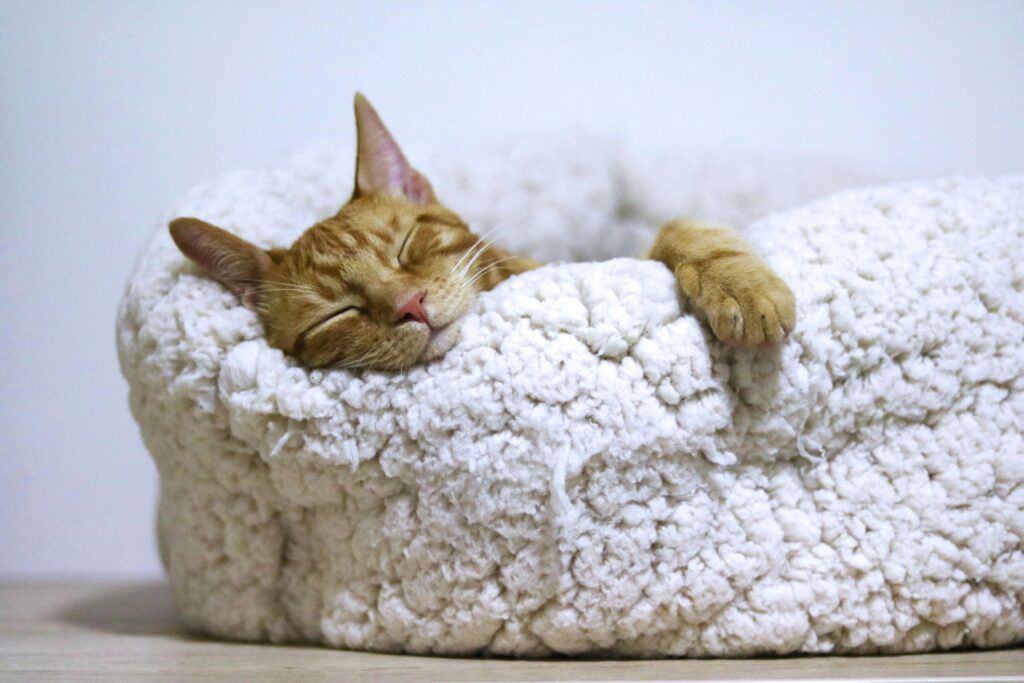When it comes to achieving your fitness and performance goals, you might think that the most important factors are what you do in the gym and what you eat. And to a point you would be correct. However, one crucial element often gets overlooked: sleep. Without sufficient quality and quantity of sleep, your hard work in the gym and with your nutrition might not yield the results you’re aiming for. So, how does sleep influence your gains and recovery, and what can you do to ensure you’re getting the most out of your training?
Key take aways:
- Sleep is essential for muscle recovery and growth: During deep sleep, your body undergoes the process of repairing muscle tissue damaged during workouts and as a result adapts to get bigger and stronger.
- Insufficient sleep hinders fat loss and promotes muscle loss: Studies show that reduced sleep can lead to increases in body weight, reduced fat loss and more muscle loss, impacting body composition negatively, especially during weight loss phases.
- Lack of sleep disrupts hormonal balance: Poor sleep increases cortisol levels and affects hunger-regulating hormones, leading to increased appetite and potentially higher calorie intake, which can undermine weight loss goals.
- Chronic sleep deprivation affects overall performance: Prolonged lack of sleep impairs multiple systems in the body, including cardiovascular, respiratory, and immune function, leading to reduced exercise performance, slower recovery, and increased risk of injury.
- Optimising sleep enhances gains: Aiming for 7-9 hours of sleep (or 8-10 hours for individual’s undertaking intense training) can improve muscle recovery, boost performance, and support better body composition outcomes.
The Growing Importance of Sleep in Fitness and Health
The connection between sleep, diet, and exercise performance is becoming a major focus in scientific research, with new studies constantly emerging. This growing body of evidence is helping to build a better understanding of just how crucial sleep is for not only recovery but also overall health and fitness outcomes. For instance, studies have demonstrated that reducing sleep from 8.5 hours to just 5.5 hours per night during a two-week weight loss period resulted in a smaller reduction in fat mass and a greater loss of lean muscle. This finding aligns with other research showing that insufficient sleep can disrupt blood sugar regulation, increase hunger and appetite, and ultimately lead to higher calorie intake.
Moreover, sleep deprivation has been linked to a decrease in muscle protein synthesis, which can negatively affect body composition by promoting muscle loss over fat loss. But the consequences of poor sleep don’t stop there. Inadequate sleep has been shown to impair various physiological functions, including those of the cardiovascular, respiratory, neuroendocrine, neuromuscular, gastrointestinal, and immune systems. Over time, chronic sleep deprivation can not only hinder your fitness progress but also elevate your risk of injury and illness, underscoring the critical role of sleep in achieving optimal health and performance.

Why Sleep is Crucial for Muscle Gains and Recovery
Sleep isn’t just a time for your body to rest—it’s a critical period for recovery, muscle repair, and growth. During sleep, your body releases and regulates various hormones, including growth hormones and insulin growth factor (IGF-1), which stimulate muscle protein synthesis and satellite cell activation, enhance amino acid uptake in muscle tissue, as well as reducing protein breakdown. All this aids in the generation of new muscle tissue and long term chronic adaptations to training. Additionally, sufficient sleep helps regulate key hormones like cortisol and testosterone, which also influence muscle growth and recovery.
Key Benefits of Sleep for Fitness Enthusiasts
- Enhanced Muscle Recovery: Sleep is when your muscles recover and rebuild. Without enough rest, your muscles don’t have the time they need for optimal repair, leading to slower progress and increased/prolonged soreness.
- Improved Hormonal Balance: Quality sleep helps maintain optimal levels of hormones that play a role in muscle growth, such as testosterone and growth hormone. It also helps regulate cortisol, the stress hormone, which can inhibit muscle development when levels are too high.
- Increased Energy and Focus: Getting enough sleep ensures you wake up refreshed, with the energy and mental focus needed to perform at your best during workouts.
Practical Steps to Improve Your Sleep for Better Gains
Improving your sleep doesn’t have to be complicated. By making small changes to your sleep hygiene, you can significantly enhance your recovery and performance. Here are some practical tips:
1. Maintain a Consistent Sleep Schedule: Try to go to bed and wake up at the same time every day, even on weekends. This helps regulate your body’s internal clock, making it easier to fall asleep and wake up naturally.
2. Create a Relaxing Bedtime Routine: Engage in calming activities before bed, such as reading, meditation, or taking a warm bath. Avoid stimulating activities like vigorous exercise or using electronic devices that emit blue light.
3. Optimise Your Sleep Environment: Ensure your bedroom is conducive to sleep—keep it dark, quiet, and cool. Consider using blackout curtains, earplugs, or a white noise machine if necessary.
4. Watch What You Eat and Drink: Avoid caffeine and heavy meals close to bedtime. Instead, opt for a light snack if you’re hungry, and consider a herbal tea that promotes relaxation.
5. Limit Naps: While napping can be beneficial, avoid long or late naps that might interfere with your nighttime sleep.

How Much Sleep Do You Need?
So, how much sleep is enough to support your fitness goals? While individual needs vary, most adults require 7-9 hours of sleep per night. However, if you’re training intensely, aiming for 8-10 hours might be more beneficial to allow your body the time it needs for recovery. Research has shown that extending sleep beyond the minimal “adequate” level (around 7 hours) to closer to 9 hours can improve physical and cognitive performance, which is especially important for athletes and serious fitness enthusiasts.
Addressing Common Concerns
You might be wondering, “What if I can’t get 8 hours of sleep every night?” Life can be busy, and sometimes getting a full night’s sleep isn’t possible. The key is to prioritise quality over quantity when necessary. Even if you can’t extend your sleep, focus on improving the quality of the sleep you do get by following the tips mentioned above.
Make Sleep a Priority for Better Gains
Sleep is more than just rest—it’s an essential component of your fitness regimen that directly impacts your gains and recovery. By making sleep a priority and adopting good sleep hygiene practices, you can maximise your efforts in the gym and achieve better results. Remember, the best training and nutrition plan won’t work as effectively if your sleep is lacking. So, take control of your sleep habits and watch your long term gains soar.

FAQs:
1. How does sleep affect muscle recovery and growth?
Sleep plays a critical role in muscle recovery and growth by allowing your body to repair and rebuild muscle tissue damaged during workouts. During deep sleep, your body regulates various hormones that are essential for muscle development, making adequate sleep crucial for achieving gains in the gym.
2. How many hours of sleep do I need to maximise my gym gains?
To maximise muscle recovery and growth, most adults should aim for 7-9 hours of sleep per night. For those engaged in intense training, 8-10 hours may be more beneficial to ensure optimal recovery and performance.
3. What are the best sleep hygiene practices for improving gym performance?
To improve sleep quality and gym performance, maintain a consistent sleep schedule, create a relaxing bedtime routine, optimise your sleep environment, and limit caffeine and heavy meals before bed. These practices can help ensure you get restorative sleep, which supports muscle recovery and growth.
4. Can lack of sleep really impact my gains in the gym?
Yes, insufficient sleep can negatively impact your gains by reducing muscle protein synthesis, increasing cortisol levels, and impairing recovery. Over time, this can lead to decreased performance, strength, endurance, and muscle mass.
5. Is it better to prioritise sleep quality or sleep quantity for recovery?
Both sleep quality and quantity are important for recovery, but if you can’t get a full 8 hours, focus on improving sleep quality. Ensure your sleep environment is conducive to rest and follow good sleep hygiene practices to make the most of the sleep you do get.
6. Can improving sleep help with fat loss and body composition?
Improving sleep can positively affect fat loss and body composition by regulating hormones that control hunger and appetite. Studies show that adequate sleep can help you lose more fat and preserve lean muscle mass during weight loss.
References:
Jåbekk, P., Jensen, R.M., Sandell, M.B., Haugen, E., Katralen, L.M. and Bjorvatn, B. (2020) ‘A randomized controlled pilot trial of sleep health education on body composition changes following 10 weeks resistance exercise’, Journal of Sports Medicine and Physical Fitness, 60(3), pp. 367-373.
Vitale, K.C., Owens, R., Hopkins, S.R. and Malhotra, A. (2019) ‘Sleep Hygiene for Optimizing Recovery in Athletes: Review and Recommendations’, International Journal of Sports Medicine, 40(08), pp. 535-543.
Bonnar, D., Bartel, K., Kakoschke, N. and Lang, C. (2018) ‘Sleep Interventions Designed to Improve Athletic Performance and Recovery: A Systematic Review of Current Approaches’, Sports Medicine, 48(3), pp. 683-703.